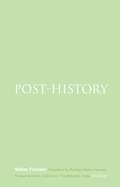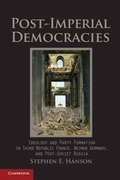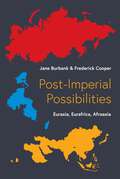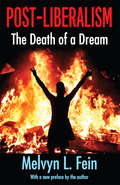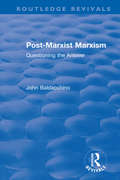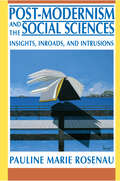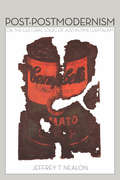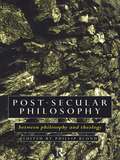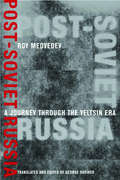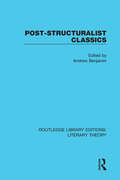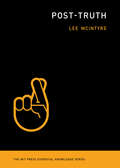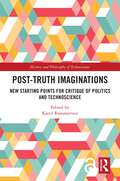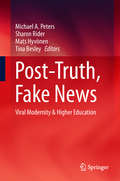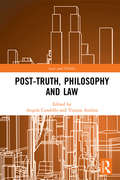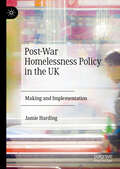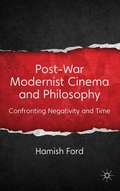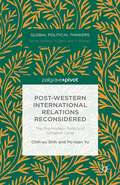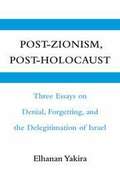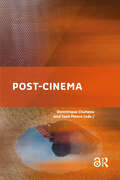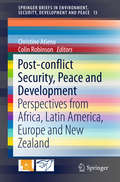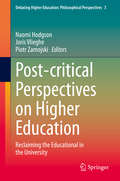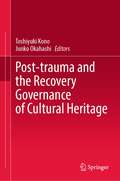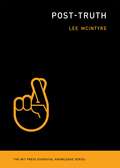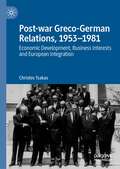- Table View
- List View
Post-History (Univocal)
by Vilém FlusserIs there any room left for freedom in a programmed world? This is the essential question that Vilém Flusser asks in Post-History. Written as a series of lectures to be delivered at universities in Brazil, Israel, and France, it was subsequently developed as a book and published for the first time in Brazil in 1983. This first English translation of Post-History brings to an anglophone readership Flusser&’s first critique of apparatus as the aesthetic, ethical, and epistemological model of present times. In his main argument, Flusser suggests that our times may be characterized by the term &“program,&” much in the same way that the seventeenth century is loosely characterized by the term &“nature,&” the eighteenth by &“reason,&” and the nineteenth by &“progress.&” In suggesting this shift in worldview, he then poses a provocative question: If I function within a predictable programmed reality, can I rebel and how can I do it? The answer comes swiftly: Only malfunctioning programs and apparatus allow for freedom. Throughout the twenty essays of Post-History, Flusser reminds us that any future theory of political resistance must consider this shift in worldview, together with the horrors that Western society has brought into realization because of it. Only then may we start to talk again about freedom.
Post-Imperial Democracies
by Stephen E. HansonThis book examines the causal impact of ideology through a comparative-historical analysis of three cases of "post-imperial democracy": the early Third Republic in France (1870-1886); the Weimar Republic in Germany (1918-1934); and post-Soviet Russia (1992-2008). Hanson argues that political ideologies are typically necessary for the mobilization of enduring, independent national party organizations in uncertain democracies. Clear and consistent ideologies can artificially elongate the temporal horizons of their adherents. By presenting an explicit and desirable picture of the political future, successful ideologues induce individuals to embrace a long-run strategy of cooperation with other converts. When enough new converts cooperate in this way, it enables sustained collective action to defend and extend party power. Successful party ideologies thus have the character of self-fulfilling prophecies: by portraying the future polity as one organized to serve the interests of those loyal to specific ideological principles, they help to bring political organizations centered on these principles into being.
Post-Imperial Possibilities: Eurasia, Eurafrica, Afroasia
by Frederick Cooper Jane BurbankA history of three transnational political projects designed to overcome the inequities of imperialismAfter the dissolution of empires, was the nation-state the only way to unite people politically, culturally, and economically? In Post-Imperial Possibilities, historians Jane Burbank and Frederick Cooper examine three large-scale, transcontinental projects aimed at bringing together peoples of different regions to mitigate imperial legacies of inequality. Eurasia, Eurafrica, and Afroasia—in theory if not in practice—offered alternative routes out of empire.The theory of Eurasianism was developed after the collapse of imperial Russia by exiled intellectuals alienated by both Western imperialism and communism. Eurafrica began as a design for collaborative European exploitation of Africa but was transformed in the 1940s and 1950s into a project to include France’s African territories in plans for European integration. The Afroasian movement wanted to replace the vertical relationship of colonizer and colonized with a horizontal relationship among former colonial territories that could challenge both the communist and capitalist worlds.Both Eurafrica and Afroasia floundered, victims of old and new vested interests. But Eurasia revived in the 1990s, when Russian intellectuals turned the theory’s attack on Western hegemony into a recipe for the restoration of Russian imperial power. While both the system of purportedly sovereign states and the concentrated might of large economic and political institutions continue to frustrate projects to overcome inequities in welfare and power, Burbank and Cooper’s study of political imagination explores wide-ranging concepts of social affiliation and obligation that emerged after empire and the reasons for their unlike destinies.
Post-Liberalism: The Death of a Dream
by Melvyn L. FeinLiberalism is dying—despite its superficial appearance of vigor. Most of its adherents still believe it is the wave of the future, but they are clinging to a sinking dream. So says Melvyn L. Fein, who argues that liberalism has made countless promises, almost none of which have come true. Under its auspices, poverty was not eliminated, crime did not diminish, the family was not strengthened, education was not improved, nor was universal peace established. These failures were not accidental; they flow directly from liberal contradictions. In Post-Liberalism, Fein demonstrates why this is the case. Fein contends that an "inverse force rule" dictates that small communities are united by strong forces, such as personal relationships and face-to-face hierarchies, while large-scale societies are integrated by weak forces, such as technology and social roles. As we become a more complex techno-commercial society, the weak forces become more dominant. This necessitates greater decentralization, in direct opposition to the centralization that liberals celebrate. Paradoxically, this suggests that liberalism, as an ideology, is regressive rather than progressive. If so, it must fail. Liberals assume that some day, under their tutelage, these trends will be reversed, but this contradicts human nature and history's lessons. According to Fein, we as a species are incapable of eliminating hierarchy or of loving all other humans with equal intensity. Neither, as per Emile Durkheim, are we able to live in harmony without appropriate forms of social cohesion.
Post-Marxist Marxism: Questioning the Answer (Routledge Revivals)
by John BaldacchinoOriginally published in 1996, Post-Marxist Marxism is a discussion of realism in a Post-Marxist context. The book argues that this discussion must take two simultaneous routes: recognizing deconstruction as the tool of enquiry to disentangle the insufficiency of contemporary answers in political philosophy and aesthetics, and reclaiming realism to move beyond the Post-Modernist tradition. To answer the issues of realism, the book revisits Lucacs' and Adorno's aesthetic questions, which in their different approaches prefigured the questions of the present. Central issues include totality; method; identarian and non-identarian dialects; the Enlightenment; and the end of Modernity.
Post-Modernism and the Social Sciences: Insights, Inroads, and Intrusions
by Pauline Marie RosenauPost-modernism offers a revolutionary approach to the study of society: in questioning the validity of modern science and the notion of objective knowledge, this movement discards history, rejects humanism, and resists any truth claims. In this comprehensive assessment of post-modernism, Pauline Rosenau traces its origins in the humanities and describes how its key concepts are today being applied to, and are restructuring, the social sciences. Serving as neither an opponent nor an apologist for the movement, she cuts through post-modernism's often incomprehensible jargon in order to offer all readers a lucid exposition of its propositions. Rosenau shows how the post-modern challenge to reason and rational organization radiates across academic fields. For example, in psychology it questions the conscious, logical, coherent subject; in public administration it encourages a retreat from central planning and from reliance on specialists; in political science it calls into question the authority of hierarchical, bureaucratic decision-making structures that function in carefully defined spheres; in anthropology it inspires the protection of local, primitive cultures from First World attempts to reorganize them. In all of the social sciences, she argues, post-modernism repudiates representative democracy and plays havoc with the very meaning of "left-wing" and "right-wing." Rosenau also highlights how post-modernism has inspired a new generation of social movements, ranging from New Age sensitivities to Third World fundamentalism. In weighing its strengths and weaknesses, the author examines two major tendencies within post-modernism, the largely European, skeptical form and the predominantly Anglo-North-American form, which suggests alternative political, social, and cultural projects. She draws examples from anthropology, economics, geography, history, international relations, law, planning, political science, psychology, sociology, urban studies, and women's studies, and provides a glossary of post-modern terms to assist the uninitiated reader with special meanings not found in standard dictionaries.
Post-Postmodernism, or, The Cultural Logic Of Just-In-Time Capitalism
by Jeffrey T. NealonPost-Postmodernism begins with a simple premise: we no longer live in the world of "postmodernism," famously dubbed "the cultural logic of late capitalism" by Fredric Jameson in 1984. Far from charting any simple move "beyond" postmodernism since the 1980s, though, this book argues that we've experienced an intensification of postmodern capitalism over the past decades, an increasing saturation of the economic sphere into formerly independent segments of everyday cultural life. If "fragmentation" was the preferred watchword of postmodern America, "intensification" is the dominant cultural logic of our contemporary era. Post-Postmodernism surveys a wide variety of cultural texts in pursuing its analyses—everything from the classic rock of Black Sabbath to the post-Marxism of Antonio Negri, from considerations of the corporate university to the fare at the cineplex, from reading experimental literature to gambling in Las Vegas, from Badiou to the undergraduate classroom. Insofar as cultural realms of all kinds have increasingly been overcoded by the languages and practices of economics, Nealon aims to construct a genealogy of the American present, and to build a vocabulary for understanding the relations between economic production and cultural production today—when American-style capitalism, despite its recent battering, seems nowhere near the point of obsolescence. Post-postmodern capitalism is seldom late but always just in time. As such, it requires an updated conceptual vocabulary for diagnosing and responding to our changed situation.
Post-Secular Philosophy: Between Philosophy and Theology
by Phillip BlondFrom Nietzsche to the present, the Western philosophical tradition has been dominated by a secular thinking that has dismissed discussion of God as largely irrelevant. In recent years however, the issue of theology has returned to spark some of the most controversial debates within contemporary philosophy. Discussions of theology by key contemporary philosophers such as Derrida and Levinas have placed religion at centre stage.Post-Secular Philosophy is one of the first volumes to consider how God has been approached by modern philosophers and consider the links between theology and postmodern thought. Fifteen accessible essays present a clear and compelling picture of how key thinkers including Descartes, Nietzsche, Freud, Wittgenstein, Heidegger and Derrida have made God a central part of their thinking. Each philosopher and how they have approached and criticised theology is placed in a clear historical context.Placing the collection in context with Phillip Blond's outstanding introduction, Post-Secular Philosophy presents a fascinating discussion of the alternatives to the relativism and nihilism that dominate Western thinking.
Post-Soviet Russia: A Journey Through the Yeltsin Era
by Roy A. MedvedevRoy Medvedev, one of the world's best-known Russian scholars and a former consultant to both Gorbachev and Yeltsin analyzes the main events that have transpired in the Russian federation since late August 1991. He looks at the plans that were meant to restructure a society in crisis but—for reasons both complex and obvious—were destined to fail. From the drastic liberalization of prices and "shock therapy" to the privatization of state owned property and Yeltsin's resignation and replacement by Vladimir Putin, this is an intricately fascinating saga of good intentions, philosophical warfare, and catastrophic miscalculations. Among the many compelling facts detailed here are Yeltsin's utter surprise—and lack of preparation—at the failed coup against Gorbachev in 1991, when power fell virtually into his lap; his failure to heed the warnings of learned advisers like Yuri Yaremenko, who knew that Western economics could not be applied to Russia; and Yeltsin's dramatic (and unprecedented) decree in 1992 allowing anyone to sell or buy anything they wished.In a sweeping conclusion covering the critical events of 1998 and 1999 as well as a detailed analysis of the 1995 and 1996 elections, Medvedev lays forth an exhaustive survey of recent political shifts, attitudes, statistics, and trends. From birth and death rates on the farm and in the city through a number of highly charged campaigns and elections to the new goal of the Communist Youth League (to become millionaires), this is a breathtakingly detailed survey of an unforgettable chapter in Russia's history.
Post-Structuralist Classics (Routledge Library Editions: Literary Theory #5)
by Andrew BenjaminModern literary theory is increasingly looking to philosophy for its inspiration. After a wave of structural analysis, the growing influence of deconstruction and hermeneutic readings continues to bear witness to this. This exciting and important collection, first published in 1988, reveals the diversity of approaches that mark the post-structuralist endeavour, and provides a challenge to the conventional practice of classical studies and ancient philosophy. This book will be of interest to students of ancient philosophy, classical studies and literary theory.
Post-Structuralist Classics (Routledge Library Editions: Literary Theory)
by Andrew BenjaminModern literary theory is increasingly looking to philosophy for its inspiration. After a wave of structural analysis, the growing influence of deconstruction and hermeneutic readings continues to bear witness to this. This exciting and important collection, first published in 1988, reveals the diversity of approaches that mark the post-structuralist endeavour, and provides a challenge to the conventional practice of classical studies and ancient philosophy. This book will be of interest to students of ancient philosophy, classical studies and literary theory.
Post-Truth (The MIT Press Essential Knowledge Series)
by Lee McIntyreHow we arrived in a post-truth era, when “alternative facts” replace actual facts, and feelings have more weight than evidence. Are we living in a post-truth world, where “alternative facts” replace actual facts and feelings have more weight than evidence? How did we get here? In this volume in the MIT Press Essential Knowledge series, Lee McIntyre traces the development of the post-truth phenomenon from science denial through the rise of “fake news,” from our psychological blind spots to the public's retreat into “information silos.” What, exactly, is post-truth? Is it wishful thinking, political spin, mass delusion, bold-faced lying? McIntyre analyzes recent examples—claims about inauguration crowd size, crime statistics, and the popular vote—and finds that post-truth is an assertion of ideological supremacy by which its practitioners try to compel someone to believe something regardless of the evidence. Yet post-truth didn't begin with the 2016 election; the denial of scientific facts about smoking, evolution, vaccines, and climate change offers a road map for more widespread fact denial. Add to this the wired-in cognitive biases that make us feel that our conclusions are based on good reasoning even when they are not, the decline of traditional media and the rise of social media, and the emergence of fake news as a political tool, and we have the ideal conditions for post-truth. McIntyre also argues provocatively that the right wing borrowed from postmodernism—specifically, the idea that there is no such thing as objective truth—in its attacks on science and facts. McIntyre argues that we can fight post-truth, and that the first step in fighting post-truth is to understand it.
Post-Truth Imaginations: New Starting Points for Critique of Politics and Technoscience (History and Philosophy of Technoscience)
by Kjetil RommetveitThis book engages with post-truth as a problem of societal order and for scholarly analysis. It claims that post-truth discourse is more deeply entangled with main Western imaginations of knowledge societies than commonly recognised. Scholarly responses to post-truth have not fully addressed these entanglements, treating them either as something to be morally condemned or as accusations against which scholars have to defend themselves (for having somehow contributed to it). Aiming for wider problematisations, the authors of this book use post-truth to open scholarly and societal assumptions to critical scrutiny. Contributions are both conceptual and empirical, dealing with topics such as: the role of truth in public; deep penetrations of ICTs into main societal institutions; the politics of time in neoliberalism; shifting boundaries between fact – value, politics – science, nature – culture; and the importance of critique for public truth-telling. Case studies range from the politics of nuclear power and election meddling in the UK, over smart technologies and techno-regulation in Europe, to renewables in Australia. The book ends where the Corona story begins: as intensifications of Modernity’s complex dynamics, requiring new starting points for critique.
Post-Truth, Fake News: Viral Modernity And Higher Education
by Michael A. Peters Sharon Rider Mats Hyvönen Tina BesleyThis edited collection brings together international authors to discuss the meaning and purpose of higher education in a “post-truth” world. The editors and authors argue that notions such as “fact” and “evidence” in a post-truth era must be understood not only politically, but also socially and epistemically. The essays philosophically examine the post-truth environment and its impact on education with respect to our most basic ideas of what universities, research and education are or should be. The book brings together authors working in Australia, China, Croatia, Romania, Canada, New Zealand, Portugal, Sweden, UK and USA.
Post-Truth, Philosophy and Law (Law and Politics)
by Tiziana Andina Angela CondelloIn the wake of Brexit and Trump, the debate surrounding post-truth fills the newspapers and is at the center of the public debate. Democratic institutions and the rule of law have always been constructed and legitimized by discourses of truth. And so the issue of "post-truth" or "fake truth" can be regarded as a contemporary degeneration of that legitimacy. But what, precisely, is post-truth from a theoretical point of view? Can it actually change perceptions of law, of institutions and political power? And can it affect our understanding of society and social relations? What are its ideological premises? What are the technical conditions that foster it? And most importantly, does it have anything to teach lovers of the truth? Pursuing an interdisciplinary perspective, this book gathers both well-known and newer scholars from a range of subject areas, to engage in a philosophical interrogation of the relationship between truth and law.
Post-War Homelessness Policy in the UK: Making and Implementation
by Jamie HardingThis book discusses homelessness policy in the UK from 1945 to 2019. It identifies five key factors that have driven policy: the favoured explanations for homelessness, distinctions between different groups of homeless people, demand for social rented housing, geographical differences and the forms of prevention preferred by policy makers. The account analyses how these factors have influenced key pieces of legislation such as the 1948 National Assistance Act, the 1977 Housing (Homeless Persons) Act and the 2002 Homelessness Act. It also identifies the key issues that policy has sought to address at different times, including children being taken into care because of their parents’ homelessness, rough sleeping, the use of bed and breakfast hotels as temporary accommodation, social exclusion and welfare reform. In addition to published sources and archival material, the book draws on the experiences of two former Ministers and other key figures in the development of homelessness policy.
Post-War Modernist Cinema and Philosophy
by Hamish FordA unique study of four major post-war European films by four key 'auteurs', which argues that these films exemplify film modernism at the peak of its philosophical reflection and aesthetic experimentation.
Post-Western International Relations Reconsidered: The Pre-Modern Politics of Gongsun Long (Global Political Thinkers)
by Chih-yu Shih Po-tsan YuThis study offers a critique of international relations from the perspective of a pre-modern Chinese thinker, Gongsun Long. It explores both the potential and the danger of the post-Western quest for geo-cultural distinction.
Post-Zionism, Post-Holocaust
by Elhanan Yakira Michael SwirskyThis book contains three independent essays, available in English for the first time, as well as a post-scriptum written for the English edition. The common theme of the three essays is the uses and abuses of the Holocaust as an ideological arm in the anti-Zionist campaigns. The first essay examines the French group of left-wing Holocaust deniers. The second essay deals with a number of Israeli academics and intellectuals, the so-called post-Zionists, and tries to follow their use of the Holocaust in their different attempts to demonize and delegitimize Israel. The third deals with Hannah Arendt and her relations with Zionism and the State of Israel as reflected in her general work and in Eichmann in Jerusalem; the views that she formulates are used systematically and extensively by anti- and post-Zionists. Elhanan Yakira argues that each of these is a particular expression of an outrage: anti-Zionism and a wholesale delegitimation of Israel.
Post-cinema: Cinema in the Post-art Era (The Key Debates: Mutations and Appropriations in European Film Studies)
by Dominique Chateau and José MourePost-cinema designates a new way of making films. It is time to ask whether this novelty is complete or relative and to evaluate to what extent it represents a unitary or diversified current. The book proposes to integrate the post-cinema question within the post-art question in order to study the new ways of making filmic images. The issue will be considered at three levels: the impression of post-art on regular films; the relocation (Casetti) of the same films that can be seen using devices of all kinds in conditions more or less removed from the dispositif of the theater; the integration of cinema into contemporary art in all kinds of forms of creation and exhibition, parallel to the integration of contemporary art in regular cinema.
Post-conflict Security, Peace and Development: Perspectives From Africa, Latin America, Europe And New Zealand (Springerbriefs In Environment, Security, Development And Peace Ser. #13)
by Christine Atieno Colin RobinsonThis book examines links between post-conflict security, peace and development in Africa, Latin America, Europe and New Zealand. Young peace researchers from the Global South (Uganda, Ivory Coast, Kenya, Brazil, Colombia) as well as from Italy and New Zealand address in case studies traumas in Northern Uganda, demobilisation and reintegration of ex-combatants in the Ivory Coast, economic and financial management of terrorism in Kenya, organised crime in Brazil, mental health issues in Colombia, macro realism in Europe and global defence reforms within the military apparatus since 1990. The book reviews linkages between regional stability, development and peace in post-conflict societies while adding on to the post 2015 international agenda and discusses linkages between peace, security and development.
Post-critical Perspectives on Higher Education: Reclaiming the Educational in the University (Debating Higher Education: Philosophical Perspectives #3)
by Naomi Hodgson Joris Vlieghe Piotr ZamojskiThis book addresses essential educational dimensions of the university that are often overlooked, not only by prevailing discourses and practices but also by standard critical approaches to higher education. Each chapter takes a different approach to the articulation of a ‘post-critical’ view of the university, and focuses on a specific dimension, including lectures, academic freedom, and the student experience. The ‘post-critical’ attitude offers an affirmative approach to the constitutive educational practices of the university. It is ‘post-’ because it is a movement in thought that comes after the critical, which, in its modern and postmodern forms is considered, in Latour’s terms, to have ‘run out of steam’. It is an attempt to articulate new conceptual and methodological tools that help us grasp our current conditions. It is not anti-critique; but rather than seeking to debunk current practices, this affirmative approach offers perspectives that shed new light on what we do as educators, on the essence of our educational practices, and on their immanent value. The focus on the educational, then, applies not only to practices that happen to take place in the educational space of the university, but also to those practices whose value we can understand in educational terms.
Post-trauma and the Recovery Governance of Cultural Heritage
by Toshiyuki Kono Junko OkahashiThis book successfully represents the indispensable interdisciplinarity of viewpoints by its authors combining legal perspectives with architectural and anthropological approaches. With the observation and analysis presented here, this book is the first to demonstrate research-based governance solutions for cultural heritage within the process of recovering from traumatic events. Its opening statement is that universal international standards are not effective enough for the specific situations of disaster-struck places.A major objective of this monograph is to allow its readers to go through a learning experience, from plural cases where reconstruction of cultural heritage became central to rebuilding a post-disaster society. This book introduces Japan as the most disaster-prone country, with a long history of confronting and overcoming the power of nature, resulting in its unique solutions for cultural heritage resilience and sustainability. But how do leadership and decision making become efficient in times of recovery? Bearing in mind what may be lacking in Japanese practices, this work also presents comparable governance models from other countries which indicate alternative solutions.While a traumatic event may occur within one night, the process of recovery could last for decades. Such disasters also tend to recur. In order that directly affected communities can sustain resilience throughout the long recovery period, and that equally severe social trauma will not be repeated, a continuous, well-maintained governance response is required, whether grounded in local knowledge or national policy frameworks. At the heart of this book is the matter of the reconstruction process involving networks of small and large communities. Each of those has a role that becomes operational through linkages of contacts, the interchange of knowledge and skills, and above all through the sharing of common goals.
Post-truth (MIT Press Essential Knowledge)
by Lee McIntyreAre we living in a post-truth world, where “alternative facts” replace actual facts and feelings have more weight than evidence? How did we get here? In this volume in the MIT Press Essential Knowledge series, Lee McIntyre traces the development of the post-truth phenomenon from science denial through the rise of “fake news,” from our psychological blind spots to the public's retreat into “information silos.” What, exactly, is post-truth? Is it wishful thinking, political spin, mass delusion, bold-faced lying? McIntyre analyzes recent examples—claims about inauguration crowd size, crime statistics, and the popular vote—and finds that post-truth is an assertion of ideological supremacy by which its practitioners try to compel someone to believe something regardless of the evidence. Yet post-truth didn't begin with the 2016 election; the denial of scientific facts about smoking, evolution, vaccines, and climate change offers a road map for more widespread fact denial. Add to this the wired-in cognitive biases that make us feel that our conclusions are based on good reasoning even when they are not, the decline of traditional media and the rise of social media, and the emergence of fake news as a political tool, and we have the ideal conditions for post-truth. McIntyre also argues provocatively that the right wing borrowed from postmodernism—specifically, the idea that there is no such thing as objective truth—in its attacks on science and facts. McIntyre argues that we can fight post-truth, and that the first step in fighting post-truth is to understand it.
Post-war Greco-German Relations, 1953–1981: Economic Development, Business Interests and European Integration
by Christos TsakasThis book explores the post-war Greco-German relationship and asks how this relationship fits into, and changes, the narrative of European integration. The book highlights West Germany’s role in shaping Greece’s development model and argues that Greece's accession to the Community in 1981 had a long back story in the modernization strategies adopted by the two countries as early as the 1950s. The success, not the failure, of those strategies lies at the root of Greece's lingering balance of payments problems: the ever-widening trade deficit with Germany, the country’s main trading partner, was the price of Greek economic growth in the decades following the war. By addressing this three-decade story of uneasy continuity, the book offers new insights into core-periphery relations in Europe, questions the conventional wisdom about Greece’s path to Europe, and challenges the way the so-called North-South divide has been adduced to explain the recent euro crisis. In doing so, the author calls attention to past cooperation between leading political and business circles in Greece and Germany, making this a useful and insightful read for historians and political scientists alike.
